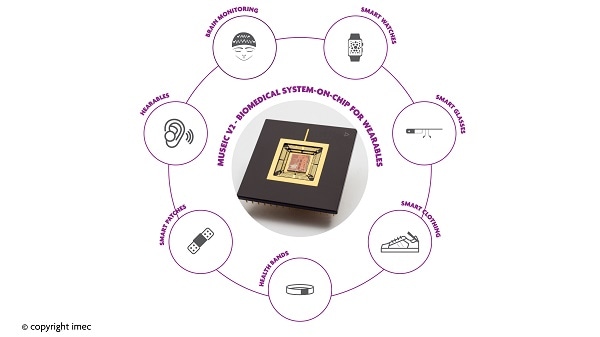
World-leading research and development center for nano-electronics and digital technology, imec, and Holst Centre (established by imec and TNO), today announced a new sensor hub integrated as a system-on-chip (SoC) intended for a broad range of wearable health devices and applications.
The SoC combines an unprecedented number of biomedical analog interfaces into a single chip, on-board digital signal processing, high fidelity operation, and multi-day monitoring capability with a single battery.
Thanks to its small form factor, the SoC can be easily integrated in new innovative designs enabling maximum user comfort. This new SoC is an enabler towards the transformation of today’s mainly curative approach to healthcare to one that is preventative, predictive and personalized.
The biomedical analog interfaces include three ECG channels, photo-plethysmography (PPG), galvanic skin response (GSR), two multi-frequency bio-impedance (BIO-Z) channels to support new applications such as impedance-tomography, body fluid analysis and stroke volume measurements, and three reconfigurable channels.
While high performance multi-modal analog readouts have been demonstrated, they lack on-board signal processing capabilities, or are too large in size. Alternatively, existing reconfigurable readouts are smaller, but have limited performance.
Imec’s and Holst Centre’s SoC moves beyond current solutions and combines advanced biomedical readouts, supported by an ARM Cortex M0+ controller and accelerators for sample-rate conversion, matrix processing, data compaction, and power management circuitry (PMIC).
The PMIC operates from a battery source (2.9- 4.5V) and generates the required voltages for the readout IC. It supports dynamic voltage scaling optimized for, but not limited to, low power and high performance applications, and can be fully customized for specific healthcare applications.
There is a clear need for accurate and reliable bio-sensing in wearables, and we are working on the building blocks to enable this. Our new SoC sensor hub underscores patient-centric capabilities and can be integrated in numerous wearable fitness and healthcare applications such as patch monitors, chest band heart rate monitors, respiration or hydration monitors and devices for blood-pressure calculation.
Chris Van Hoof, program director wearable health at imec
About imec
Imec is the world-leading research and innovation hub in nano-electronics and digital technologies. The combination of our widely acclaimed leadership in microchip technology and profound software and ICT expertise is what makes us unique. By leveraging our world-class infrastructure and local and global ecosystem of partners across a multitude of industries, we create groundbreaking innovation in application domains such as healthcare, smart cities and mobility, logistics and manufacturing, and energy.
As a trusted partner for companies, start-ups and universities we bring together close to 3,500 brilliant minds from over 70 nationalities. Imec is headquartered in Leuven, Belgium and also has distributed R&D groups at a number of Flemish universities, in the Netherlands, Taiwan, USA, China, and offices in India and Japan. In 2015, imec's revenue (P&L) totaled 415 million euro and of iMinds which is integrated in imec as of September 21, 2016 52 million euro. Further information on imec can be found at www.imec.be.
About Holst Centre
Holst Centre is an independent R&D center that develops technologies for wireless autonomous sensor technologies and for flexible electronics, in an open innovation setting and in dedicated research trajectories. A key feature of Holst Centre is its partnership model with industry and academia based around shared roadmaps and programs. It is this kind of cross-fertilization that enables Holst Centre to tune its scientific strategy to industrial needs.
Holst Centre was set up in 2005 by imec (Flanders, Belgium) and TNO (The Netherlands) and is supported by local, regional and national governments.
Located on High Tech Campus Eindhoven, Holst Centre benefits from, and contributes to, the state-of-the-art on-site facilities. Holst Centre has over 200 employees from some 28 nations and a commitment from over 50 industrial partners.